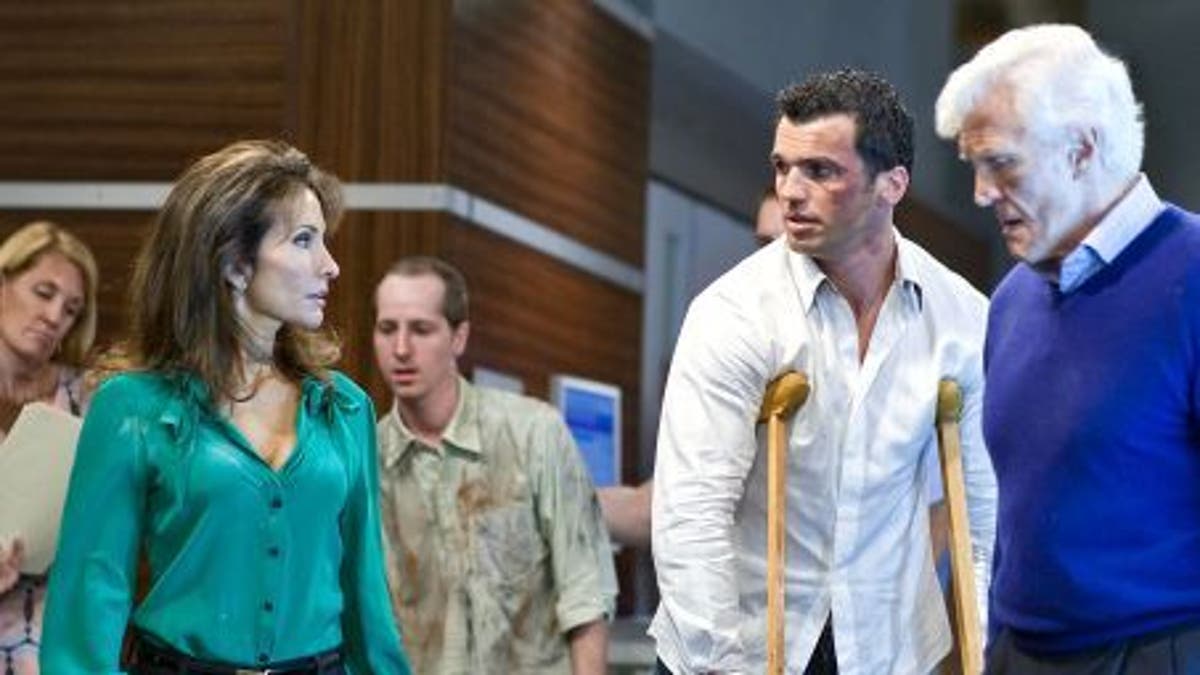
Lucci in an episode of 'All My Children.' (ABC)
In the past three years three beloved soaps have been given their walking papers—“Guiding Light” and “As the World Turns” from CBS and “Passions” from NBC. In 1970 there were 19 soap operas on the air. There were ten left in 2000 and today just six remain.
“All My Children”, on air for 41 years, could be the next to go, according to Deadline.com, which reported on speculation that the program will be replaced in the fall lineup with a talk show after it had two weeks of all-time low ratings.
A rep for ABC gave the vaguest of responses regarding “All My Children’s” uncertain future.
“This rumor has been around for quite some time, so it’s just another story in a long line of these stories that appear from time to time,” ABC’s Jori Petersen told Fox411.
But the cast and crew of the soap has been spooked enough to start calling their agents and preparing new head shots.
“Everyone always says the writing is on the wall for soap operas to shut down, but this time the writing is in capital letters,” said one writer for “All My Children” who asked that we not use his name in case the show does actually go on. “We all hope we can get jobs in reality television.”
Regardless of AMC's lifespan, experts predict it won’t be long before the daily dramas go the way of the dodo.
“I see the soap disappearing from the airwaves. It will become a thing of the past like dialed phones and radio serial dramas,” Jeff Danis, President of DPN Talent Agency in Beverly Hills told Fox 411. “Because of all the amazing new series programming that is available to the viewer, it just can’t compete.”
“All My Children” has been on air since 1970, was once one of the most recorded shows on television and frequently took the number one slot in daytime. The show finished last among the six soaps the week of March 7, and brought in only 463,000 viewers in the key female 18 - 49 demographic. "All My Children" may be finishing last, but times have become increasingly difficult for the entire genre, which got its start as dramatic serials for women sponsored by soap companies on the radio, to survive in today’s fragmented media landscape.
Today, the soaps face a perfect storm of destructive forces.
There are more working woman than ever before. The ones who are staying home—young stay-at-home moms—are more likely than in years past to watch shows with their children Soap ratings have dropped due to competition from cable. And the number of original shows shown at all during daytime have dropped because of competition from syndication.
“The median age is rising and number of viewers are dropping. Slowly but surely the number of soap operas has been dropping even such enduring ones like ‘Guiding Light’ and ‘As the World Turns’—By the end of the decade in 2020 it could be at conceivable that there will be not soap operas on network TV,” says television analyst Brad Adgate of Horizon Media.
The good news is that 10 years is like plenty of time for the remaining contenders in daytime television to evolve into something that could still be lucrative for their franchises. If something doesn't change the hundreds of actors who depend on daily soap work, as well as the writers and the crew will trickle into an already over saturated system dominated today by reality television.
But with the dwindling importance of soaps in the television consumer’s viewing repertoire, the programs have lost their cache as launching pads for bigger and better things for actors anyway.
“Many of the actors are now just going straight into series television. With cable and the Internet, there is just so much more content, that the actors don’t really need the soap as a ‘launching point’ as they did. It is a bit ‘antiquated’,” Danis says.
The 30 staffers at Soap Opera Digest and Soap Opera Weekly will be out of a gig once soaps die off too. But Lynn Leahy, editorial director for the publications, remains optimistic, because she believes the soap fan base remains fiercely loyal.
“Judging from our mail, fans remain deeply committed to shows and characters. They have nicknames for their favorite couples, lobby for certain people to get together, and band together for fan campaigns. We get postcards and cupcakes and candy at the office from groups promoting couples and actors,” Leahy says.
Leahy admits the network soaps may not have much longer than a few lives to live, but she thinks the daily dramatic form could live on in some iteration, keep some of her folk and all those actors employed.
“The genre will survive, but not necessarily in its current format. The problem isn’t so much that viewers stopped liking their shows, they stopped being at home to watch them,” Leahy says. “Soaps started as 15-minute episodes, and we may see them go back to that, with viewers ‘snacking’ on soaps in 15-minute bites on their smart phone, rather than at home in front of a television. Web soaps are proliferating now, but they’ve yet to figure out a model that makes it a robust business.”





















